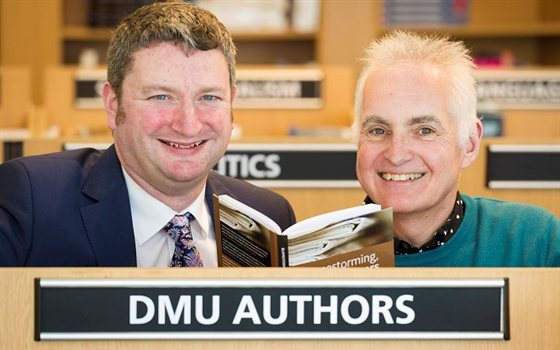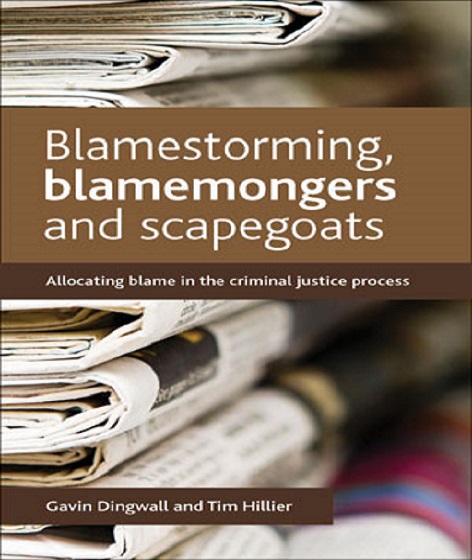“It's a fair cop, but society's to blame,” says a man in a Monty Python sketch arrested by the Church Police. The Church Policeman responds: “Agreed. We'll be charging them too.”
These days society is much keener to apportion blame more directly, argues a leading law academic from De Montfort University (DMU), Leicester on this week’s ‘Thinking Allowed’ programme, on BBC Radio 4.

PUBLISHED: Tim Hillier (right), Associate Head of Leicester De Montfort Law School with co-writer Gavin Dingwall, Professor of Criminal Justice Policy at DMU
Today’s blame culture and its effect on the criminal justice system is examined in a ground breaking new book, Blamestorming, Blamemongers and Scapegoats: Allocating blame in the criminal justice system (Policy Press, 2015), by Tim Hillier, Associate Head of Leicester De Montfort Law School and Gavin Dingwall, Professor of Criminal Justice Policy at DMU.
The BBC invited Tim Hillier to join ‘Thinking Allowed’ presenter Laurie Taylor and former Director of Public Prosecutions Lord Ken Macdonald QC in the Radio 4 studio to discuss ‘Crime and Blame.’
‘Blamestorming’ entered the Oxford English Dictionary recently and describes the process of collectively finding someone to blame for a mistake no-one is willing to own up to. It’s a phenomenon supported by a modern media that’s hungry for clear answers and scapegoats before it moves on from a story.
RELATED NEWS
Law School garden party thanks its legal supporter
Disney on trial: How students used hit film to teach law
Young legal eagles win prizes in student law competition
Tim and Gavin, who have been DMU colleagues for 10 years, collaborated on the book from 2013, either taking primary responsibility for particular chapters or by working together in the same room. Focusing on blame in the criminal justice process, their book explores the role and parameter of culpability within the legal system.
“With today’s developments in science I think we’ve all become more attuned to being in control of our lives and when that isn’t the case we look for someone to blame,” said Tim as he prepared for the radio broadcast.
“Also, politicians see apportioning blame as a useful tool to deflect accountability, constantly reaching for new legislation, while the media plays a huge part in stoking the search for scapegoats with every natural disaster and most criminal activity feeding their preoccupation with blame.
“Our book examines the extent to which the desire to apportion blame has influenced policy decisions and puts forward the concept of ‘blame’ as a way in which to view contemporary criminal justice policy and practice.”
The co-writers use the cases of killer nurse Beverly Allitt and paedophile Jimmy Savile to show how media and society have focused on both individuals and organisations in the blame game.
Professor Vanessa Munro, University of Leicester, has called the book: “A much-needed critical review of the role and parameters of ‘blame’ within criminal regulation.
“Accessibly written and insightful in its analyses throughout, this book compels a re-evaluation of our attributions and tactics of blaming in 21st Century criminal justice policy.”

Posted on Thursday 4 June 2015